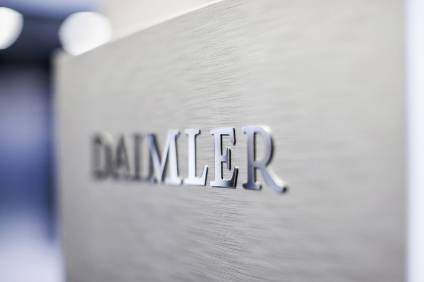
Daimler has raised its profit outlook for 2020 on the back of improving demand and measures to contain cost and preserve cash. Third quarter EBIT was up by an impressive 14% on last year.
Cost cuts and draining dealer inventory as well as a big rebound in Mercedes sales in China boosted the results.

Discover B2B Marketing That Performs
Combine business intelligence and editorial excellence to reach engaged professionals across 36 leading media platforms.
The company’s Mercedes-Benz car division reported especially strong quarterly sales in China (+23% and a new record). However, overall group vehicle sales in Q3 turned out 8% behind the same quarter of last year.
In terms of the impact of the pandemic, Daimler now expects profit for the year to be at 2019’s level (an upward revision on previous guidance) despite much lower sales and revenues this year.
Daimler’s total unit sales for the third quarter decreased by 8% to 772,700 cars and commercial vehicles (Q3 2019: 839,300) and revenue slipped by 7% to EUR40.3 billion (Q3 2019: EUR43.3 billion). EBIT increased by 14% to EUR3,070 million (Q3 2019: EUR2,690 million). Adjusted EBIT, reflecting the underlying business, was EUR3,479 million (Q3 2019: EUR3,142 million) and net profit was EUR2,158 million (Q3 2019: EUR1,813 million).
Daimler said high free cash flow of around EUR5.1 billion in the quarter reflects the ‘continuous efforts in cost-cutting and cash-preservation measures as well as the positive operating performance across all divisions’. Additional positive factors are the dividend from the Chinese joint venture BBAC of EUR1.2 billion, positive contributions from working capital and seasonal phasing impacts.
Harald Wilhelm, Member of the Board of Management of Daimler AG, responsible for Finance & Controlling/Daimler Mobility, said: “Our strong product portfolio and the positive market recovery drove us to a good performance. We have successfully pushed forward our comprehensive efforts regarding cost control and cash management. With this momentum, we are on track to make our business more weatherproof. However, the transformation of Daimler is a long-distance race. We are keeping up the pace with focus and full discipline.”
Unit sales by the Mercedes-Benz Cars & Vans division decreased by 4% to 673,400 vehicles in the third quarter (Q3 2019: 705,000). Despite that, adjusted EBIT increased to EUR2,417 million (Q3 2019: EUR1,868 million) and adjusted return on sales to 9.4% (Q3 2019: 7.0%).
Improved pricing and a significant reduction in fixed costs had a positive impact on earnings, Daimler said.
In terms of outlook Daimler said it assumes that economic conditions in the most important markets continue to normalize and in particular that no further setbacks occur as a result of the COVID-19 pandemic. Based on this, Daimler expects that the significant unit-sales reductions recorded in the first nine months due to the COVID-19 pandemic will only be partially offset by the end of the year. The company therefore said it expects group unit sales and revenue in 2020 to be ‘significantly lower than in the previous year.
Nevertheless, on the basis of the expected market development and the current assessments of the divisions, Daimler anticipates Group EBIT in 2020 ‘at the level of the prior year’.
Mercedes-Benz Cars
Mercedes-Benz Cars sold 566,600 cars of the Mercedes-Benz and smart brands in the third quarter of this year (Q3 2019: 604,700). Despite the ongoing COVID-19 pandemic, deliveries from July through September benefited from a recovery in end-customer demand in many markets. This increased demand, the company said, could be met at short notice, in particular by reducing dealer inventories.
In Europe, 229,800 vehicles were sold (Q3 2019: 253,200), thus continuing the sales revival. In Germany, the region’s core market, Mercedes-Benz Cars sold 84,200 vehicles, almost matching the prior-year level (Q3 2019: 85,100).
In China, Mercedes-Benz Cars’ largest market, sales increased by 23% to 213,800 units (Q3 2019:173,300), setting a new record for a third quarter. In the US, Mercedes-Benz Cars delivered 52,000 vehicles, significantly below the prior-year level (Q3 2019: 75,700).
See also: Daimler reports ‘faster than expected’ recovery






